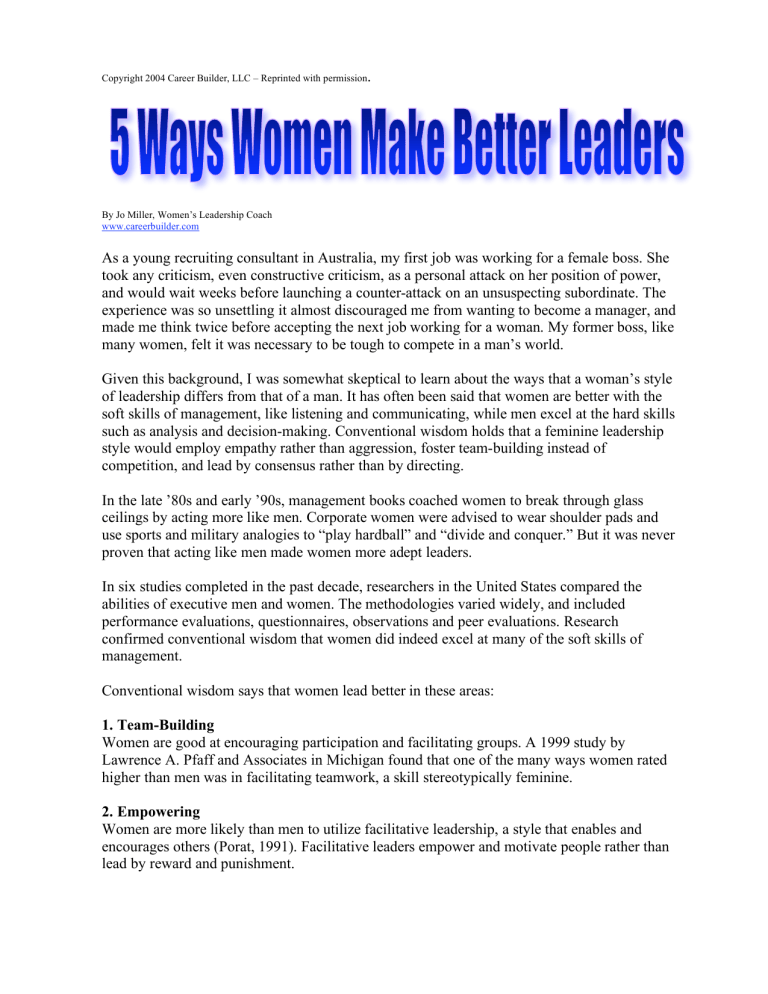. As a young recruiting consultant in Australia, my first job... took any criticism, even constructive criticism, as a personal attack...

Copyright 2004 Career Builder, LLC – Reprinted with permission
.
By Jo Miller, Women’s Leadership Coach www.careerbuilder.com
As a young recruiting consultant in Australia, my first job was working for a female boss. She took any criticism, even constructive criticism, as a personal attack on her position of power, and would wait weeks before launching a counter-attack on an unsuspecting subordinate. The experience was so unsettling it almost discouraged me from wanting to become a manager, and made me think twice before accepting the next job working for a woman. My former boss, like many women, felt it was necessary to be tough to compete in a man’s world.
Given this background, I was somewhat skeptical to learn about the ways that a woman’s style of leadership differs from that of a man. It has often been said that women are better with the soft skills of management, like listening and communicating, while men excel at the hard skills such as analysis and decision-making. Conventional wisdom holds that a feminine leadership style would employ empathy rather than aggression, foster team-building instead of competition, and lead by consensus rather than by directing.
In the late ’80s and early ’90s, management books coached women to break through glass ceilings by acting more like men. Corporate women were advised to wear shoulder pads and use sports and military analogies to “play hardball” and “divide and conquer.” But it was never proven that acting like men made women more adept leaders.
In six studies completed in the past decade, researchers in the United States compared the abilities of executive men and women. The methodologies varied widely, and included performance evaluations, questionnaires, observations and peer evaluations. Research confirmed conventional wisdom that women did indeed excel at many of the soft skills of management.
Conventional wisdom says that women lead better in these areas:
1. Team-Building
Women are good at encouraging participation and facilitating groups. A 1999 study by
Lawrence A. Pfaff and Associates in Michigan found that one of the many ways women rated higher than men was in facilitating teamwork, a skill stereotypically feminine.
2. Empowering
Women are more likely than men to utilize facilitative leadership, a style that enables and encourages others (Porat, 1991). Facilitative leaders empower and motivate people rather than lead by reward and punishment.
3. Communication
Women working in education were found to use a more open communication style that came from their focus on relationships. As a result, they communicated more frequently than men with their colleagues, stakeholders and subordinates (Connor, 1992). In the business world, open communication encourages feedback and sharing of information and power.
4. Consensus-Building
Women are talented collaborators and support contributive, consensual decision-making
(Porat, 1991). Team members appreciate knowing their contributions are valued. However, consensus building can have pitfalls for women. An over-reliance on this method of decisionmaking can make a leader appear indecisive and too dependent upon the opinions of others. A true leader knows when to stop conferring and propose a decision.
5. Almost Everything Else
But women’s strengths is not limited to these skills alone. Of the six studies, five indicated that female bosses scored higher than men on a majority of leadership skills measured. In the sixth study, men and women ranked evenly.
In the study by Lawrence A. Pfaff and Associates of more than 1000 managers in 211 organizations, women outranked men in soft skills such as communication and teamwork, but also in areas not traditionally considered female, such as planning, goal-setting and facilitating change. In areas traditionally considered male, such as decisiveness, women ranked on par with men.
In Business Week , Shirley Ross, an industrial psychologist who oversaw a study for Hagberg
Consulting Group, was quoted as saying, “Women are scoring higher on almost everything we look at.”
Evidence has mounted that if you are a woman, then statistically speaking, your natural, authentic leadership style is working just fine. Yet women try to be more like men, while men are unencumbered by such thoughts, and get ahead simply by being themselves. Can you imagine a male chief executive rising to the top job by pretending to be someone other than who he is? If you are a woman and want to be a better manager, don’t try to lead more like a man. Lead like a strong woman, with confidence and backbone.
Jo Miller is a Women’s Leadership Coach who helps managerial and executive women realize their potential as leaders. Visit www.jomiller.net to attend a free executive briefing teleconference to learn about Jo’s coaching programs. Find out if you qualify for a free leadership coaching session!
Connor, N.L (1992). Restructuring schools: will there be a place for women? Clearing House, 65(6), 337-339.
Porat, K. L. (1991). Women in administration: The difference is positive. Clearing House, 64(6), 412-415




